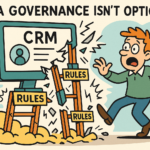Data Governance Isn’t Optional

Why Your CRM Is Only as Strong as Your Rules
Nonprofits often treat their CRM (Constituent Relationship Management) system as the silver bullet that will transform their fundraising, marketing, and supporter engagement. But here’s the blunt truth: your CRM is only as good as the rules that govern it. Without clear, enforced data governance, your system is nothing more than a messy database with expensive licensing fees.
Why Data Governance Matters
Data governance is the framework of policies, standards, and rules that dictate how data is entered, managed, and used. It ensures data is accurate, consistent, and secure across the entire organisation. Without governance, staff will invent their own shortcuts, naming conventions, and workarounds. The result? Duplicate records, unreliable reports, and a system nobody trusts.
Your CRM doesn’t fail because of technology; it fails because of human behavior left unchecked.
The Risks of “Optional” Governance
Too many nonprofits believe they can skip formal governance and “figure it out as they go.” This is a dangerous mindset. Here’s what happens:
- Bad data multiplies – Incorrect addresses, incomplete records, or inconsistent coding create hours of cleanup work later.
- Reports lose credibility – Executives stop trusting the numbers, and strategic decisions get made based on guesswork.
- Fundraising suffers – Poor segmentation and faulty donor histories mean missed opportunities and damaged relationships.
- Staff morale tanks – When users can’t rely on the system, frustration grows, and adoption plummets.
Without governance, your CRM becomes a liability instead of an asset.
Strong Rules = Strong CRM
Governance doesn’t have to be complicated, but it does have to be deliberate. Strong data governance rests on three pillars:
- Clear Standards
Define how data should be entered. That includes everything from address formatting to campaign naming conventions. If 10 people can interpret a field 10 different ways, you don’t have governance. - Enforced Accountability
Someone must own data quality, and everyone must follow the rules. This isn’t optional. Your governance framework should include training, monitoring, and consequences for noncompliance - Regular Oversight
Governance isn’t “set and forget.” Establish a data governance committee or working group that meets regularly to review rules, address issues, and adjust policies as your organi=sation evolves.
The Payoff
When governance is strong, your CRM becomes a strategic asset:
- Reports and dashboards are trusted sources of truth.
- Campaigns are properly segmented, leading to stronger fundraising results.
- Staff use the CRM confidently, knowing data is consistent and reliable.
- Leadership makes decisions based on facts, not hunches.
Bottom Line
Migrating to a CRM without implementing data governance is like buying a car and refusing to change the oil—you’re headed for a breakdown. The technology is only as strong as the discipline behind it. Data governance isn’t optional. It’s the only way to make your CRM worth the investment.
